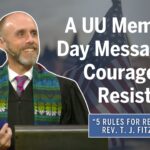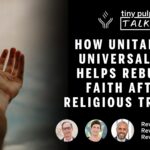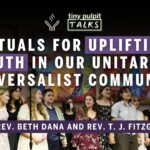Artists Who Inspire: Beyoncé Knowles-Carter | Rev. T. J. FitzGerald | 08.04.2024
Sermon Transcript
Speaker 2:
32 Grammy Awards the most by any person ever, highest grossing tour by a female artist in history. Sorry, Ms. Swift. Highest grossing tour by an artist of color ever and even as I mentioned these metrics, these measurements to convince you of greatness, I do it to introduce you or to bless you with an introduction to an artist you might not know some of you, and to give you some of the sense of how successful that artist is and has been in the field of recorded and live music over the past 25 years. We end the series of artists who inspire with one of the great Texans of all time, the queen bee, Beyonce. It was September 4th, 1981 in the city of Houston, Texas that Tina and Matthew gave birth to Beyonce. They wrapped her in swaddling clothes. They laid her in a manger.
Wasn’t any room at the inn. My apologies for that, but in my research this week, I kept confusing Beyonce and people talking about her with God and the way he might talk about God. So welcome visitors. The heresies are just getting started here. The story of Beyonce’s miraculous birth though, and it is a miracle, it really is because she actually performed her own very deep genealogical research. She discovered that among her rich Creole ancestry in New Orleans were her French ancestors who settled in Louisiana in the latter part of the 18th century, 1700s. She’s been in the south a long time, her people, and she also discovered that a direct descendant… or she’s the direct descendant of someone who was enslaved and then later married the man who had enslaved her in bondage. Beyonce’s history is world history, is US history, and I took Texas history in Plano and hers is the real Texas history.
Beyonce made history again this year with the release of a country album, Cowboy Carter. On it, she sings… I heard you. Yes, yes, yes. On it, she sings Blackbird like we heard today and thank you. What a rendition. Yeah. And I think it was sung in the right way because I think of it as a prayer. It’s a prayer written by Paul McCartney to honor, he said, The Little Rock Nine. I discovered after the first service some people don’t know who the Little Rock Nine is. This is a group of nine schoolchildren who in 1957 were enrolled by the local NAACP in the school system in Little Rock, Arkansas and the 100 1st Airborne had to bring them to class for their safety. Just realized I had a little hole in my sermon and maybe in what we’re all teaching around here. That was in 1957.
Melba Pattillo Beals was 15 when she helped integrate the Little Rock schools as one of the nine. She’s 82 now and she goes by Dr. Melba Pattillo Beals now. She remembers hearing the song Blackbird growing up. She talked about it and she felt she knew it was probably about black pain and perseverance when she heard it. So when Paul McCartney later publicly said it was about the experience of the little girls in particular who were part of the Little Rock Nine, it was not a surprise to Dr. Beals. So when Beyonce released her version of this song on Cowboy Carter, they called Dr. Beals to ask her about it. She said that when she heard McCartney sing Blackbird Fly, she felt seen, that she’d been seen.
But when she heard Beyonce sing “blackbird fly,” what she heard was, “I’ve done it and you can do it too.” Who runs the world?
Okay, just checking. The struggle Dr. Beals lent her voice and energy to, the struggle for basic civil rights is not over by any means. There remain those who perpetuate and embody false myths and stereotypes in this nation, in this world to deadly consequences. We heard just this past week the story of Sonya Massey in Springfield, Illinois defenseless and shot in her own home by the very sheriff’s deputy she called to help her.
The names and the lives that went before Sonya Massey are too numerous to name in the time we have left, the idea, but really the fact that life is more dangerous in one’s community because of how somebody looks, because of whose ancestors they are. Say what you want about religion or culture or causes or conditions. Say what you want if they’ll even let you say it without banning you for doing so. Say what you want. It doesn’t change the truth. It doesn’t change this corrosive root of bigotry and its dreadful root, its dreadful fruit, inequity.
Mm-hmm. It does not bring back those killed and those lost those unfindable and to date as we sit here, it doesn’t make it less than three times more lethal for a black person to give birth in this state than for a white person to do so. We can talk all we want about these things, but until something is done, nothing changes. I got a question after the 9:30. Someone said, “It’s good to see everyone get all excited about this, but what are we going to do?” That’s right. How do we get started is the question, how do we find the energy? How do we do the work? It takes inspiration and it took y’all to church today.
From time out of mind, places of worship are where. They’re where we take our ideas are beliefs and our principles and we do figure out how to put them in practice. At least any church I want to be going to is doing that and we do it here in worship. Maybe it’s in coffee hour as we’re handing things out and finding out what’s going on. Maybe it’s in the meetings we have later today. Maybe it’s at the gas pump with someone you ain’t met, but it is where it happens. It’s to see if change can come from those ideas, from those principles and from those values as we live them. Church is a grand experiment in lived theology, in walking are talking and because God is good all the time, there is a church of Beyonce. It exists, it is real. And I’m not just talking about her legendary performance at Coachella, which you all must watch.
The scholar and the theologian, Professor Yolanda M. Norton who is also a preacher, is also a singer, is also an organizer because who runs the world?
Created and brought to life the Beyonce Mass. Beyonce Mass is I quote, “A womanist worship service that uses the music and personal life,” I love that, “Of Beyonce as a tool to foster an empowering conversation about black women, their lives, their bodies, and their voices.” It is the vision and the imagination of the Reverend Dr. Yolanda Norton, which is the inspiration that honestly led me here today to talk to you.
I’ve watched a few versions of Beyonce Mass. The one from Lincoln Center is pretty good. It is a time and a place where a superstar of theology meets with a superstar of music and performance in a way that can change lives if we let it. Dr. Norton names Beyonce Mass as womanist. For those of you who don’t know, womanist Theology is a branch of black liberation theology, which started around the same time actually as liberation theology took hold in Central America with Oscar Romero and it was James Hal Cone of Union Theological Seminary who set its cornerstone, but some of his female colleagues and some of his students felt that the theologies of black liberation were missing something central to the wisdom and knowledge that they had, women.
The word womanism actually comes from the literary and theological superstar, Alice Walker, author of The Color Purple. One of the central themes of that book, if you haven’t read it, is the narrator Celie and how Celie makes sense of the world that she is inhabiting around her. She talks to God, she goes to church. She meets the most extraordinary people like Shug Avery who our reading spoke about today all while matching her hopes and visions to how she wants to live, how she wants to get free, all of that, the whole book is a theological work and you better believe it.
If anyone takes anything from my words here today, hear this, women of color have been doing theology for as long as theology was theology. You hear that right? Maybe it wasn’t written down or maybe someone took it just saying. Maybe it didn’t survive the ages and the pages that we expect. Maybe it was not talk or story or song about quite the right saints or quite the right saviors, but working through the ways to give and sustain life across oceans and continents and making sense of that life for their families and for themselves. That’s a form of theology. It’s a form of making peace or sense of the divine of the great mystery and of God. Got it?
Now, sometimes the world gets itself ready finally to hear what is being said and it was the confluence of that genius and inspiration and preparation and her flawless execution that followed the sacrifices made by children like the Little Rock Nine that helped Alice Walker’s work soar into the world that was finally ready to receive it. Well, those parts of the world that didn’t ban it. Whoa, sorry. I got a little excited and it furrowed that work, furrowed a field for black women by her commercial success. It’s just true that I pray is only just starting to flourish and bear transformative fruit. Among the most inspiring products of this work is actually the Spiritual Alliance of Communities for Reproductive Dignity or SACRED, which Daniel and this church help to bring to prominence as a member of its founding board. SACRED would not be possible without womanist theology, which is at its core.
And when we teach SACRED curriculum here in the fall in a few weeks, get you out your realm and start signing up, we talk in detail about womanist theology here and it is a form of liberation theology. Now the basic idea of all liberation theology is that God is concerned. God has an option, call it a preference for the poor and those whom society counts out. You do not have to look far in sacred texts to see the final victory by those who society has counted out over the powerful who thought they were in control.
The second born, sorry Solange, the second born, the smaller in stature, the low that’s an immigrant, the unclean of spirit they say, take your pick, the lowest of the low in society, those are the people whose sacred stories, sacred texts, and especially those texts in the Bible hold up over and over as having the heart of God of the great mystery and being delivered from persecution to places of honor. And people in power are afraid of this truth that has won out over and over. And if you don’t believe me, if only I could think of a recent example of a man going on television and trying to rob a black woman of her identity and the power she draws from it.
If anyone’s heard such a thing, please don’t tell me. I’m trying to sleep at night. Liberation theology shines a light on a society from the perspective of the person who’s longing for liberation. It asks, what’s it going to take to get this group to be equal in honor and safety and with everyone else in that society? And the distance between those two things are the measure of the faith and the actions everyone in that society has got to take to bring about justice and equity for all. Right.
But the gut punch of liberation theology is that if you think it’s the lowly and underserved who are being liberated in that new world, if you think that’s the perspective which the searching light of truth is cast, well you might be someone in need of some liberation because that is the turn. That’s the trick of real liberation. Its message convicts those societies that allow or worse that seem to thrive on the presence of a seemingly powerless group in their midst deemed expendable or worse, whom a society actively is trying to get rid of through often heinous crimes. That is the heart of liberation theology. It reveals to the people who think they are in charge, that they are the ones who are ill, they are the ones who are wanting, they are the hollow and those in need of the good news.
And for us today, the good news is Beyoncé. As someone who forms a tremendous part of our world’s culture, y’all be walking around the street and someone’s going to say something you don’t even realize that’s coming from Beyoncé. It’s being transmitted to you out in the world. It’s easy to miss because of this though, how countercultural Beyoncé and artists like her are. You saw the crowds in that opening right? Could you feel her patience, her quiet amid the sea of the people that wanted the show? And what does she sing about in those shows? Respect, dignity, sex, love, then sex again, justice, equity, a little more sex and then getting the job done when nobody else can. That’s the final theme, but our recipients of our whole lives would be very comfortable in a Beyonce show. She opens with lift every voice and sing, better known as the Black National Anthem.
This song heralds the heart of a theology of liberation. It calls for the day when every voice is lifted to the listening skies with the harmony of liberty. Don’t worry, we’re going to sing at friends that the aching distance of division will finally be closed and victory won. Of the enormous wealths of gifts that Beyonce gives freely to the world, I think the revolutionary countercultural place that Beyonce holds what makes her a superstar, a star that births other stars. What makes her work fitting for a mass is this. She is a global icon and the future, and at the same time, her single vulnerable life touches the heart of a child who’s 82, who six decades ago broke a barrier no one thought anybody could. She’s in the future and the past at once.
Her visionary art tears down barriers of genre, which in the music industry is just a word they use for know your place to show the world how dimly, how dimly the world is lit. When walls like that fill it up before the grace of her superstardom showed a new way. And that’s why Beyonce is God darn talented. In my prayer anyway, that’s another. This week many of us heard is a hundred years a century since the birth of James Baldwin, which is only shocking because almost everything he wrote is still applicable today. Stay tuned for another sermon. Baldwin famously said this, “Not everything that is faced can be changed, but nothing can be changed until it is faced.”
God almighty, oh, what I would give to bring James Baldwin to a Beyoncé show, to see his face in that sea of color and queerness and passion and for him to know what she has faced. I can just imagine the essay he would write for Rolling Stone about what the industry has done to her, tried to take from her and how it has treated her and how she has overcome it with grace and dignity and how she has prevailed that they thought she came to play, but realized she came to slay. Alice Walker’s words once more, “In her, there is achieved at long last balance and the ability to consider things in themselves. Not as other people might wish her too, but as they actually are, she is free.”
May that freedom light some way for you, for us, please God, for Texas and for the world as we the bearers of this free faith bent on liberation from one of the greatest Texans of all time to be brave in the face of opposition, to be bold in our nose to what wants to put us in our place and to show up in love crazy in love in all we do for whoever we meet. And may we remember that we do this not to be liked, good thing, not to be excellent, not to achieve or for awards or for rewards and not even to be better and certainly not just to be right, but for collective liberation. Right? To lift every voice and to sing at last, the harmony of liberty to those listening skies until victory is won. Now let’s sing it together. Please rise as you are able and join in singing. We’re just doing. Verse one, make it count. 149.








